 Dr. Jayashree Sood
Dr. Jayashree Sood
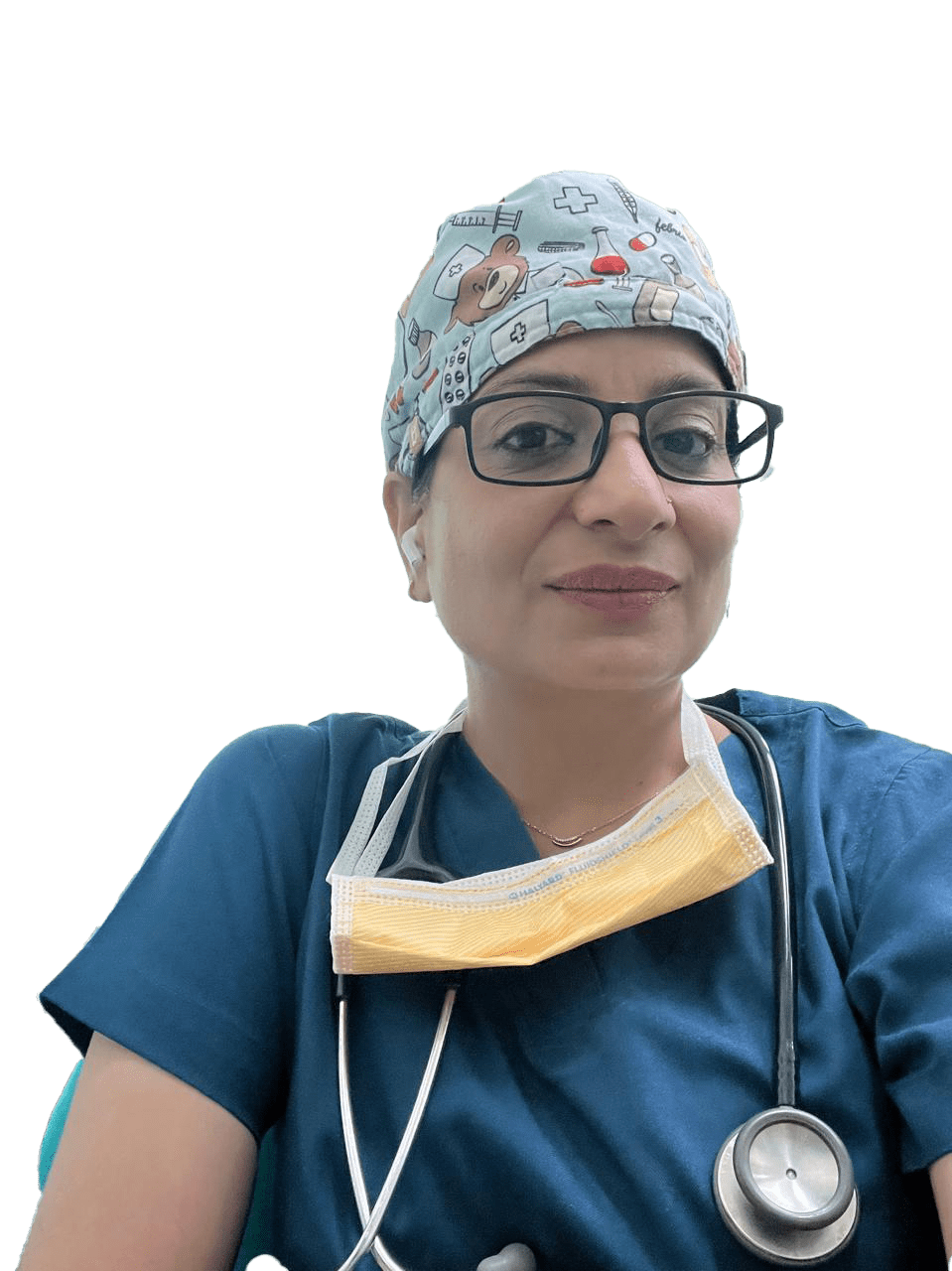 Dr. Geeta Setia
Dr. Geeta Setia
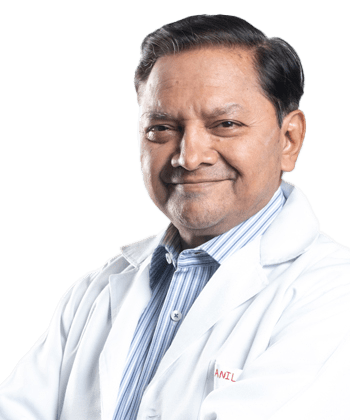 Dr. Anil Kumar Jain
Dr. Anil Kumar Jain
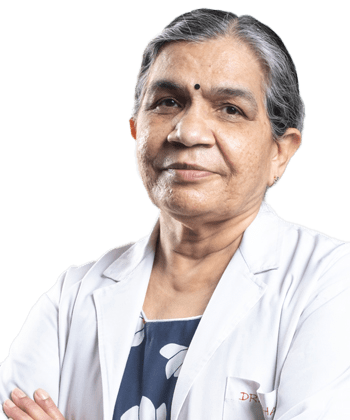 Dr. Bimla Sharma
Dr. Bimla Sharma
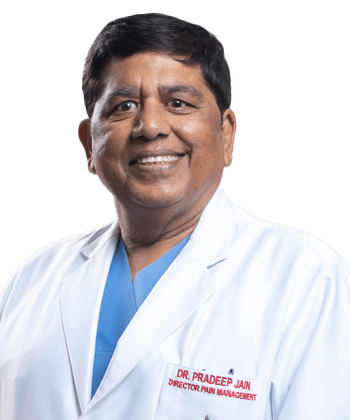 Dr. Pradeep Jain
Dr. Pradeep Jain
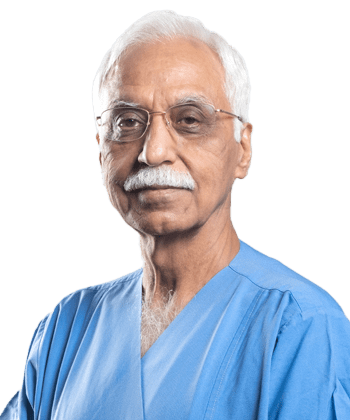 Dr. K.K. Narani
Dr. K.K. Narani
 Dr. Amarjeet Singh (Anaesthesia)
Dr. Amarjeet Singh (Anaesthesia)
 Dr. Shashank Pandey
Dr. Shashank Pandey
 Dr. Rakesh Saxena
Dr. Rakesh Saxena
 Dr. Shikha Sharma
Dr. Shikha Sharma
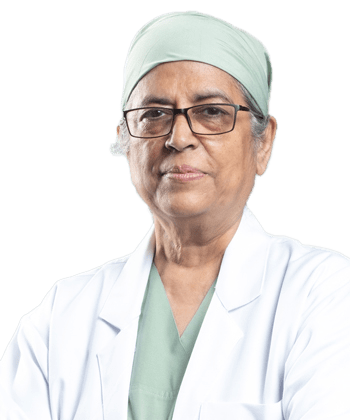 Dr. Chand Sahai
Dr. Chand Sahai
 Dr. Raj Kamal Agarwal
Dr. Raj Kamal Agarwal
 Dr. Bhavdeep Kaur
Dr. Bhavdeep Kaur
 Dr. MD Ishtiyaque Hussain
Dr. MD Ishtiyaque Hussain
 Dr. Raj Kamal Agarwal
Dr. Raj Kamal Agarwal
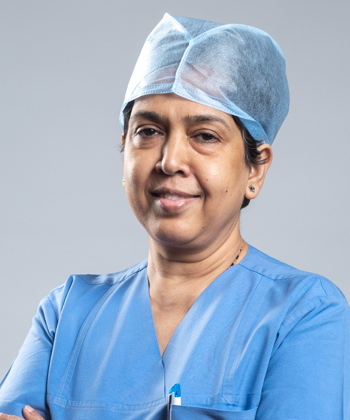 Dr. Deepanjali Pant
Dr. Deepanjali Pant
 Dr. Rashmi Jain
Dr. Rashmi Jain
 Dr. Amitabh Dutta
Dr. Amitabh Dutta
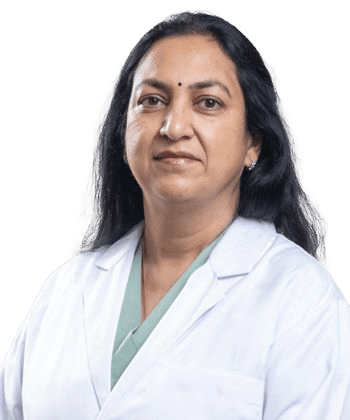 Dr. Anjeleena Kumar Gupta
Dr. Anjeleena Kumar Gupta
 Dr. Archna Koul
Dr. Archna Koul
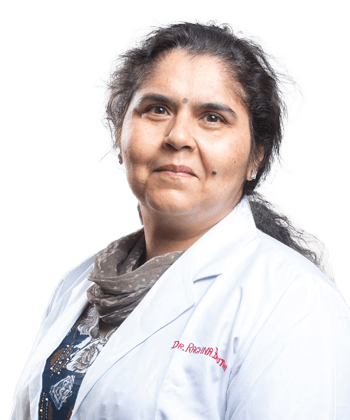 Dr. Rachna Bhutani
Dr. Rachna Bhutani
 Dr. Kriti Puri
Dr. Kriti Puri
 Dr. Naresh Dua
Dr. Naresh Dua
 Dr. Neetu Jain
Dr. Neetu Jain
 Dr. Anjali Gera
Dr. Anjali Gera
 Dr. Manish Gupta
Dr. Manish Gupta
 Dr. Prabhat Kumar Choudhary
Dr. Prabhat Kumar Choudhary
 Dr. Keerthi Jain
Dr. Keerthi Jain
 Dr. Himanshu Gaur
Dr. Himanshu Gaur
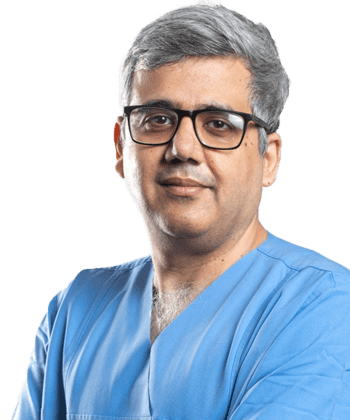 Dr. Nitin Sethi
Dr. Nitin Sethi
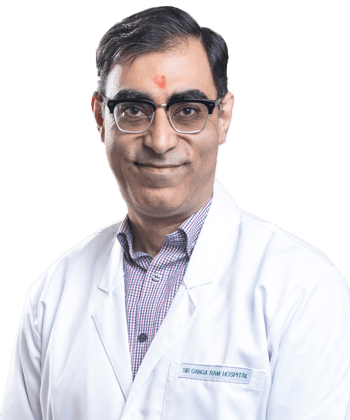 Dr. Savitar Malhotra
Dr. Savitar Malhotra
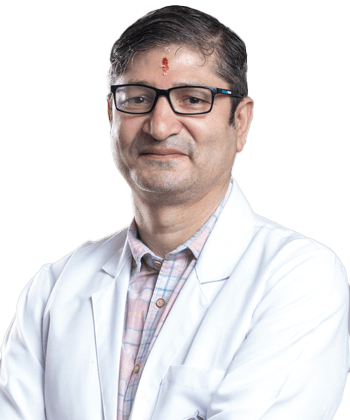 Dr. Bhuwan Chand Panday
Dr. Bhuwan Chand Panday
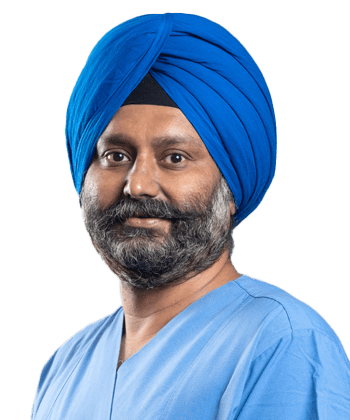 Dr. Mahindra Singh Baansal
Dr. Mahindra Singh Baansal
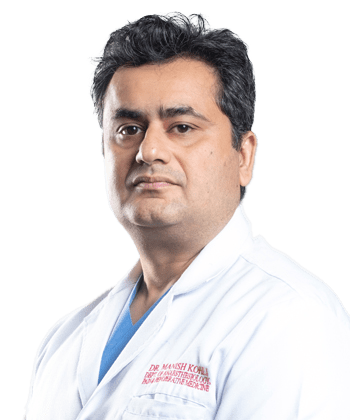 Dr. Manish Kohli
Dr. Manish Kohli
 Dr. Abhjit Singh Pahwa
Dr. Abhjit Singh Pahwa
 Dr. Ashwin Marwaha
Dr. Ashwin Marwaha
 Dr. Ajay Sirohi
Dr. Ajay Sirohi
 Dr. Akhil Kumar
Dr. Akhil Kumar
 Dr. Anirban Roy
Dr. Anirban Roy
 Dr. Jasmine Kumar
Dr. Jasmine Kumar
 Dr. Rajshree Sharma
Dr. Rajshree Sharma
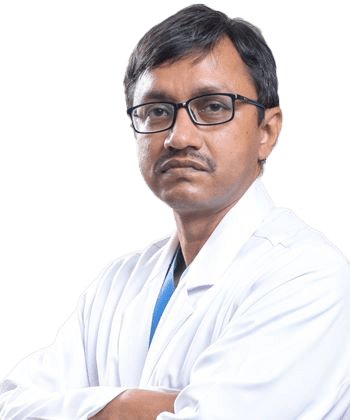 Dr. Alok Kumar
Dr. Alok Kumar
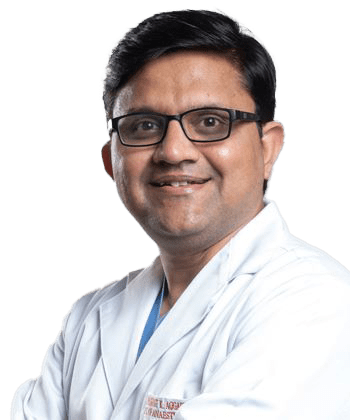 Dr. Prashant K. Aggarwal
Dr. Prashant K. Aggarwal
 Dr. Sumit Kalra
Dr. Sumit Kalra
 Dr.
Dr.
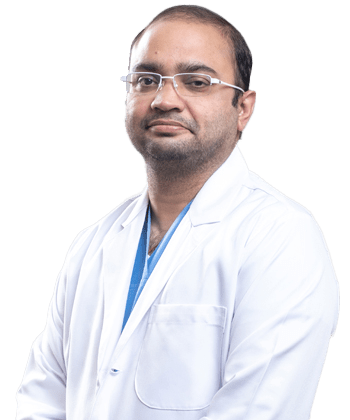 Dr. Vineet Dhawan
Dr. Vineet Dhawan
 Dr. Mahima Singh
Dr. Mahima Singh
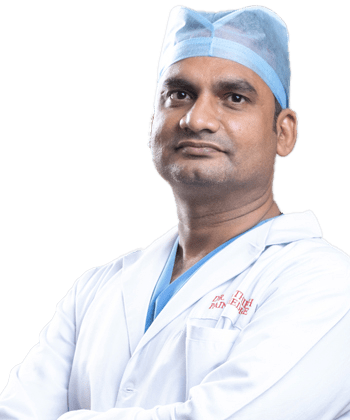 Dr. Mithilesh Kumar
Dr. Mithilesh Kumar
 Dr. Suhani
Dr. Suhani
As anesthesiologists, we are responsible for the safety and well-being of patients before, during, and after surgery. This includes placing patients in a state of controlled unconsciousness called “ general anesthesia” the provision of “ regional anesthetics” where only a portion of the body is made numb, or administering ‘sedation’ when indicated for the relief of pain or anxiety. These anesthetics provide continuous pain relief and sustain patients’ critical life functions as they are affected throughout surgical, obstetrical, or other medical procedures.
The role of the anesthesiologist extends beyond the operating room. The anesthesiologist is responsible for the preoperative assessment of the patient, an evaluation process that carefully considers both the patient’s current state of health and the planned surgical procedure that allows anesthesiologists to make judgments about the safest anesthesia plan for each individual patient. The anesthesiologist is also responsible for the well-being of the patient postoperatively while the patient emerges from the effects of anesthesia. They are often involved in the management of acute postoperative pain, as well as chronic and cancer pain.
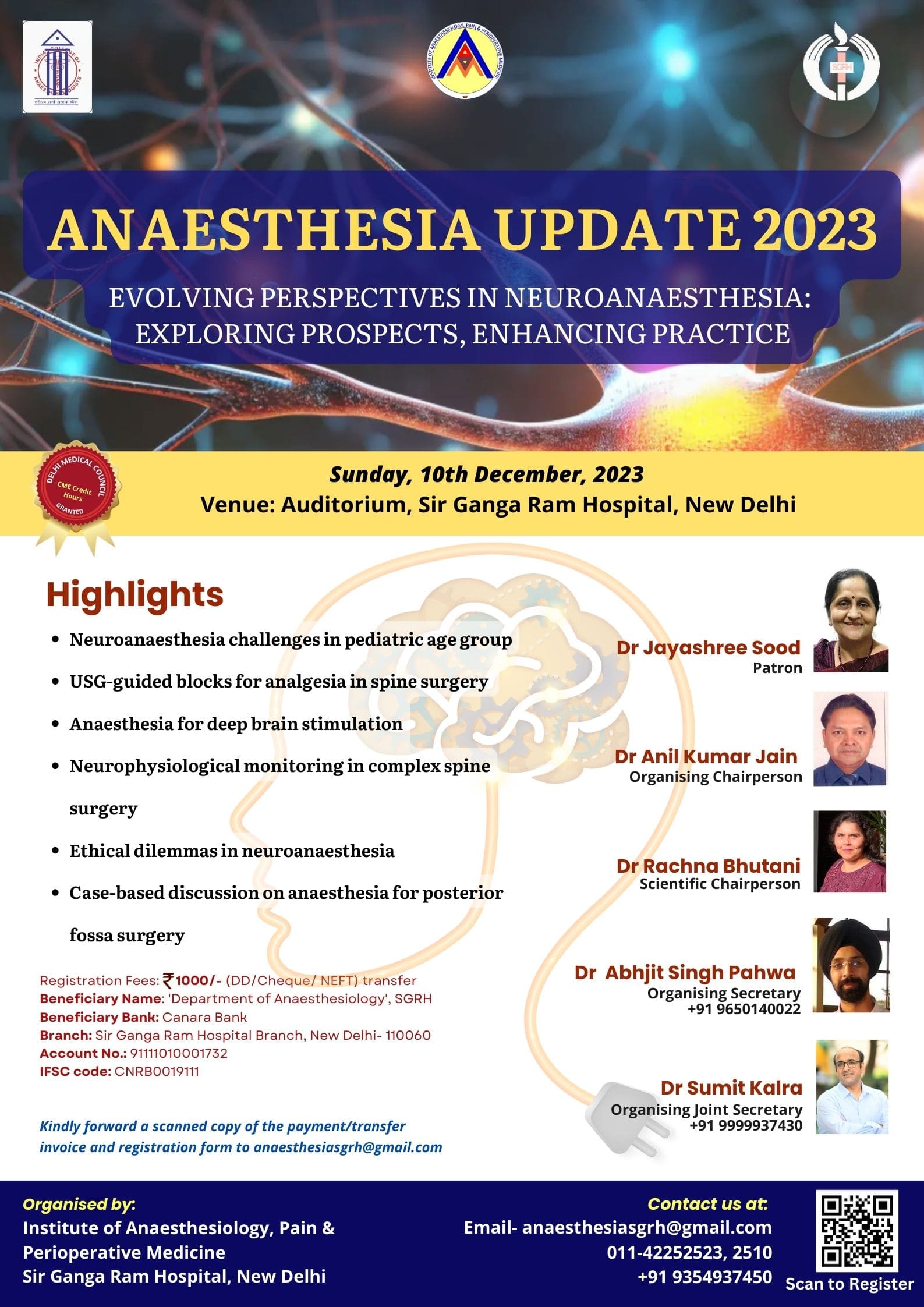
The Department of Anaesthesiology, Pain and Perioperative Medicine, Sir Ganga Ram Hospital (SGRH), has successfully completed over three decades of existence. Over the period of time, it has seen significant technological, human-resource, functional, and clinical evolution. Our Department has consistently maintained its position as a state-of-the-art essential clinical services provider. The Department boasts of a pool of 35 consultants, 2 clinical assistants, and 12 residents (postgraduate trainees, senior residents) over and above the rotating interns, guest clinical observers (liver/kidney transplant anesthesia, general anesthesia), and fellows (pain clinics). Clinical anesthesia services, academics, research, charitable activity, and community outreach are integral central facets of the Department. The Department sustains anesthesia services for over fifteen surgical sub-specialties. Recently, we have added advanced Robotic-anaesthesia into our armamentarium and have facilitated over 300 major ROBOT-aided surgeries. Our Department provides round-the-clock consultant-based anesthesia services for incoming elective/ emergency surgical patients that run into over 25000-patients annually. We also have a robust ‘ Pain Relief Unit’ that covers acute postoperative pain services and outpatient clinics for elective pain management.
The Department of Anaesthesiology, Pain, and Perioperative Medicine looks forward to newer/emerging techniques that propose to lead to improvement in patient management. We have inculcated many advanced technology/aids to bolster routine clinical anesthesia management, including; patient safety monitors: specific hemodynamic monitoring for fluid administration, optimization during critical/long surgery (stroke-volume variation), noninvasive cardiac-output management (Lidco-Plus), anesthesia-depth monitoring (Bispectral-Index); Pain medicine: electromyography-guided transforaminal injections for low backache, radio-frequency ablation, and ultrasound-aided nerve-blocks, alcohol/neurolysis, and Ozone-nucleolytic. We also have developed new functional innovative techniques, such as airway management; ‘neo-fulcrum’ for dental protection during airway management; ‘guided tactile probing and ‘rigid endoscope-assisted’ difficult airway management; and radiograph-assisted first-attempt (RFA) neuraxial access in the difficult spine in the elderly, etc. We are also the front-runners in chronic pain-management techniques.
The Department of Anaesthesiology, Pain, and Perioperative Medicine offers a host of clinical services, academic training, and research. Apart from the provision of routine clinical anesthesia, we impart DNB-postgraduate Training (Anesthesiology), Fellowship (pain relief services, liver-transplant anesthesia, Neuroanaesthesia, Obstetrics Anaesthesia, and Thoracic Anaesthesia), Observership (general anesthesia, liver-transplant anesthesia, pain management) and opportunity for new MBBS-graduates under the Compulsory Rotatory Internship program.
(i) Clinical Anesthesia :
The presence of a collective anaesthesia practice system in our Department has facilitated the experts/consultants (n=35) to undertake 80-100 operations-a-day along with active teaching (3-year postgraduate DNB training, operation-theatre technologists/scrub-nurse training, visiting fellows/observers in Anesthesiology, etc.) and related investigator-driven clinical research. All the anesthetic episodes are fully controlled and covered by designated consultants only. We provide anesthesia care delivery (Clinical Anesthesia, Postoperative Intensive Care) to over fifteen surgical specialty areas (liver/kidney transplantation, major knee/hip replacements, neurosurgery, pediatric surgery, robotic thoracic/urologic/minimal access interventions, etc.) for scheduled/emergent surgical intervention. Over the last couple of decades, we have been pioneers in Anesthesiology service provision in the surgical sub-specialty area, including but not restricted to, thoracic, bariatric, laparoscopic/robotic, organ transplant, neurosurgical and pediatric anesthesia, etc. Anesthesia services are rolled out from the dedicated operation rooms (ORs, n=28), a day-care system, and an intensive care backup. All the operation theatres are modular and are fully equipped with an advanced laparoscopy armamentarium.
1. Intensive Care :
The intensive care service to perioperative patients is vital and occupies an essential transition period between the surgery and a discharge-fit patient. We have a robust intensive-care system covering generic (immediate-postoperative care recovery rooms 6th/7th floor, post-anesthesia intensive care, [PACU]) as well as specific intervention-oriented (Liver & Kidney Transplant Intensive Care Units) surgical patients. We have the privilege of having to offer intensive care to around 10% of surgical patients every day. In addition, an intricate and well-structured intensive care patient transfer procedure is operational for the intra-hospital transfer of critically-ill patients.
2. Acute Pain Services :
The Department of Anesthesiology, Pain and Perioperative Medicine has the distinction of being the first in the country to initiate an Acute Pain Service (APS) program that caters to all surgical patients in the postoperative period. While it helps all the patients in receipt of anaesthesia to get pain alleviation, it has a definitive positive impact on the post-surgical patient outcome. It has been, for some time now, a much-needed fillip to the completeness of clinical anesthesia services and consequential patient satisfaction with healthcare delivery.
3. Chronic Pain Management :
In conjunction with the APS system, chronic pain management simultaneously took off as an additional provision. Interestingly, since it involved non-surgical patients whose care demanded preoperative evaluation, OR-based intervention, and postoperative care, a day-case-patient-floor-system is evolved to ensure comprehensive pain relief services. A Pain Relief Clinic is set up to allow preoperative evaluation and initial counseling for possible prospective pain-relief-related technical intervention. The post-pain-intervention care is responsibly supervised 24x7 by our APS team.
4. Daycare Anesthesia Services :
A state-of-the-art 18-bedded daycare facility awaits the patients who are electively scheduled for short-duration minor surgical procedures. With the societal changes, especially those emanating out of the increasing formation of nuclear family units, the daycare anesthesia care delivery of our department expects and is geared up to receive a greater number of patients who require day-surgery other than pure surgical reasons. The facility is ably manned by anesthesia-oriented patient safety monitors and experts controlling them. The nursing care (1:4) and expert medical cover is available around-the-clock to entertain routine patient inflow and any unanticipated exigency.
We run dedicated anesthesia care delivery clinics with sub-specialty area experts. The following clinics serve the patients in the respective core areas:
1. Pre-anaesthesia Evaluation Clinic:
situated on the 5th floor SSRB block patient reception area. The Pre-anaesthesia Evaluation Clinic starts early (07:00 Hrs) for the incoming daycare patients. After the initial surge, it settles with the routine flow of impatient as well as outpatients who are posted for afternoon surgery. It closes late in the evening (20:00 hrs) keeping up to the timings of concurrently running surgical OPDs.
2. Pain Relief Clinic:
We actively cater to chronic pain patients through the Pain Relief Clinic functional during 08:00-18:00 hrs. In addition, we undertake a 2-hour free clinic in the SGRH general OPD on Monday and Friday (10:30-12:00 Hrs). A private outpatient clinic is also run by the pain specialists of our department.
3. Labor Counseling/Analgesia Clinic:
A Labor Analgesia Clinic is also open and services, including, labor pain relief prior to and during the normal delivery process, patient/attendant information about the labor-epidural intervention, counseling for the proactive obstetric plan, and the role of anesthesiology experts to the patient with active labor pain is provided throughout the day and also in the emergency hours.
4. Patient Counseling Clinic:
is operational for those patients who wish to be apprised of the anesthesia intervention process, which they would be subjected to in the course of the planned surgery. This helps in allaying anxiety, nurturing confidence, counseling the relatives/attendants, and facilitating the informed consent process for surgery and overall, it adds to the preoperative patient satisfaction.
5. The Palliative Care Clinic:
provides a multidisciplinary clinical consultation in palliative medicine to all patients with chronic or life-limiting conditions in need of counseling. The General OPD is held on Monday & Thursday, from 10:00 am in Room No. F-24.
With the changing scenario and recent developments in anesthesia sciences having a positive impact on anesthesia care delivery in terms of infrastructural and operational systems, the Department of Anesthesiology, Pain, and Perioperative Medicine have been all the way up there with concurrent advances/innovations that are taking place in around the world. We have pride in initiating and sustaining dedicated sub-specialty anesthesia care in major surgical areas, including, Organ Transplant Surgery (Kidney [1987], Liver [1996]), Plastic & Reconstructive Micro-Surgery, Laparoscopic Surgery (1994), Joint Arthroplasty (1996) Thoracic Surgery (2000), Bariatric & Metabolic Surgery (2004), Robotic Surgery (2011) to name a few. We have to pleasure of initiating the country’s first fully-functional Acute Pain Service (APS) unit. We are also the first to introduce an Audit system for clinical anesthesia and a Quality Assurance Cell within our department (2006). We successfully look forward to and have always embraced new technology on the anvil, including, newer monitoring systems (BIS, advanced cardiac monitoring [invasive, non-invasive], neuromuscular monitoring, airway dynamics assessment, etc], interventions [ultrasound-guided initial venous access/nerve blocks, radiofrequency ablation, ozone-therapy] and maintenance profile [Bair-Hugger warming system, Flowtron-SCI mechanical anti-DVT system, rapid fluid-infusion system, thromboelastography, etc.] Above stated advantages and a proactive stance has helped us with the opportunity of extending anesthesia care to the Honorable President of India.
In the year 2007, in conjunction with the initiation of the Surgical Laparoscopy Simulation Center, our department came up with Advanced Anesthesia & Cardio-pulmonary Resuscitation Simulation Center. It helps in facilitating technical training for our postgraduate students and the dedicated support staff before they actually start working in the consultant-supervised system in real-patient anesthesia case scenarios. This facilitates patient safety and also brings down undue morbidity purely due to suboptimal training.
The Department of Anaesthesiology, Pain and Perioperative Medicine have been constantly following a ‘review®renew’ agenda for over five years now. Based on the above, we have set internal standards in the form of system operating procedures (SOPs), random policy introduction and application, learning from morbid/critical study cases, and teaching/training of younger members (DNB postgraduates, senior residents, clinical associates, junior consultants). The primary objective is centered on patient safety and satisfaction. We intend to further broaden the scope of diverse procedures, which specifically target the enhancement of current patient care both in terms of content (technical adequacy) and quality (patient satisfaction). Overall, we aim to follow a set of serial objectives that are intricately linked and have a prospective step-ladder-orientated growth projection. Current objectives are:
The collective efforts towards objectives (as above) are likely to yield solid, inclusive, and comprehensive sustainable mechanisms of anesthesia-specific health care delivery. We aim to deliver consistent clinical services as well as remain sensitive to the immediate/long-term need of the surgical patient population coming to SGRH, New Delhi.
The Department of Anaesthesiology, Pain and Perioperative Medicine, Sir Ganga Ram Hospital has an inclusive clinical research development (CRD) plan in place since 2003. Intensive clinical practice, thesis/dissertation-oriented research, morbidity meets, active audit system, and consultant-based innovative practices have formed the very basis from which research and consequent publications have emanated. In addition, our consultants get actively involved in subspecialty anesthesiology conferences (National/International) as delegates/presenters (platform, poster)/invited faculty/oration lectures). Most importantly, our consultants have been very aware of contemporaneous research and time and again have critically responded to the concurrent contentious publications.
We have a robust academic program, which centers on DNB postgraduate training. Our Department also administers structured training to nurses OR technicians, observers (anaesthesia, pain-relief services, organ transplant, laparoscopic surgery), and guest observers/fellows. The outreach academic endeavors of our Department include Annual SGRH Anaesthesiology Updates (since 2003), Postgraduate Assembly (since 2010), monthly ISA-Clinical Meets (Delhi Chapter), and, Faculty-lectures.
The Department of Anaesthesiology, Pain, and Perioperative Medicine has continuously put endeavors for a forward-looking, proactive, flexible, and patient-oriented developmental outlook. Furthermore, we are sensitive to the identification of ‘new’ problem areas related to clinical services and/or quality enhancement relating to existing practices. Our Department continually frames new policy(s) based on the objective need to enhance anesthesia health care delivery. In the future, we plan to introduce as a part of routine practice, objective anesthesia techniques, preoperative forums (critical case discussion, patient counseling), structured postoperative patient follow-up, and an e-record system that archives the above. In addition, we have a focused stance on patient rights, good ethical practices, and study of socio-economic implications that may arise from anaesthesia healthcare delivery process. Our Department trains the post-graduates trainees on “simulation-based training methods” that covers broader/essential anesthesia domain (major vascular access, neuraxial block, airway access techniques). Importantly, we also have an orientation program for disaster preparedness, and handling mass-casualty situations. We critically look forward to prioritization in terms of ‘case downtime’, type of cases, collective consultant approach to emergency patients, and overall care plan (postoperative ventilation/observation).
The Department of Anaesthesiology, Pain & Perioperative Medicine has 35 consultants, in addition to senior residents and postgraduate students. There are 21 state-of-the-art operation theatres with modern anaesthesia machines and advanced patient monitoring devices. We conduct an average of 80-100 operations every day in various surgical specialties.
Our department is actively involved in imparting training to candidates pursuing postgraduate training in anaesthesia (DNB). Research and further improvement of the art of Anesthesiology is our endeavor.
As anesthesiologists, we are responsible for the safety and well-being of patients before, during, and after surgery. This includes placing patients in a state of controlled unconsciousness called “general anesthesia”, the provision of “regional anesthetics” where only a portion of the body is made numb, or administering sedation when indicated for the relief of pain or anxiety. These anesthetics provide continuous pain relief and sustain patients’ critical life functions as they are affected throughout surgical, obstetrical, or other medical procedures.
The role of the anesthesiologist extends beyond the operating room. The anesthesiologist is responsible for the preoperative assessment of the patient, an evaluation process that carefully considers both the patient’s current state of health and the planned surgical procedure that allows anesthesiologists to make judgments about the safest anesthesia plan for each individual patient. The anesthesiologist is also responsible for the well-being of the patient postoperatively while the patient emerges from the effects of anesthesia. They are often involved in the management of acute postoperative pain, as well as chronic and cancer pain.